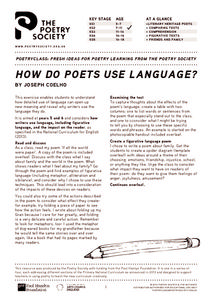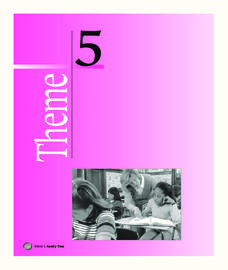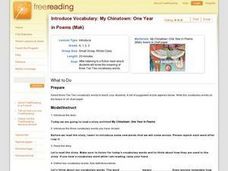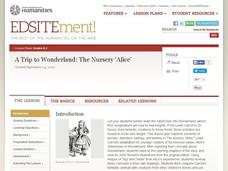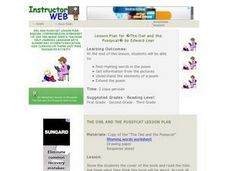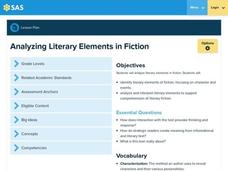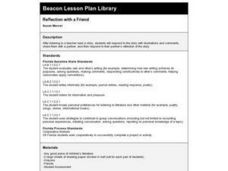Curated OER
Earth Day Reading Comprehension
Here is a really neat Earth Day reading passage that can be used online or printed. The initial passage provides learners with the opportunity to read a poem entitled, "Woodman, Spare That Tree!" It also includes comprehension questions...
Soft Schools
Practice Reading Poetry
Identify the rhyme scheme in a worksheet that features "Mary Had a Little Lamb." Readers use the nursery rhyme to reinforce poetic elements in four comprehension questions.
Academy of American Poets
Teach This Poem: “One day is there of the series” by Emily Dickinson
A activity begins with learners saying three words they associate with Thanksgiving dinner. They examine a picture of a menu from a Thanksgiving meal and discuss what they believe the artist wants them to feel, pointing out details....
Curated OER
Reading Comprehension: Fiction and Nonfiction
This resource is made up of a series of reading passages with accompanying questions. On the first page, learners read the definitions of both fiction and non-fiction. They examine four short selections before writing either fiction or...
Academy of American Poets
Teach This Poem: "November 2: Día De Los Muertos" By Alberto Ríos
Scholars examine a colorful and detailed picture, then view an engaging video in preparation for reading the poem "November 2: Día De Los Muertos" by Alberto Ríos. Learners discuss their observations, feelings conveyed, and the...
Poetry Society
How do Poets Use Language?
Why do writers choose the language they do? Here's a resource that has the poet himself answer that very question. Joseph Coelho explains why he chose the words and images he used in his poem, "If All the World Were Paper."
Curated OER
Vocabulary and Comprehension Packet
For this Junie B. Jones is a Graduation Girl worksheet packet, learners will unscramble 15 vocabulary words using text boxes as a tool, search for and circle 15 vocabulary words in a word search, complete 10 cloze sentences using a word...
Busy Teacher’s Café
"Smart" by Shel Silverstein
Find out just how smart your young mathematicians are with this cross-curricular math and language arts lesson. After first reading Shel Silverstein's poem "Smart", students draw pictures of coins to model the different exchanges...
Curated OER
"The Wind" by James Reeves
Inntroduce primary learners to essential critical reading strategies with an activity based on James Reeves' poem, "The Wind." Learners listen as the poem is read, first as a riddle, and then re-read with the title visible. The class...
Scholastic
Comprehension During Independent Reading
Ideal for a language arts class, literary unit, or independent reading assignment, a set of reading worksheets address a wide array of skills. From poetic elements to nonfiction text features, you can surely find a valuable resource in...
Houghton Mifflin Harcourt
Nature Walk: English Language Development Lessons (Theme 2)
Walking in nature is the theme of a unit designed to support English language development lessons. Scholars look, write, speak, and move to explore topics such as camping, woodland animals, instruments, bodies of water, things found at a...
West Corporation
Making Inferences – Use Your Mind to Read!
How can you tell if someone is happy? The lesson works with elementary and middle school scholars to activate their schema and pay attention to details to make inferences in their daily lives, poetry, and other literature. Cleverly...
Houghton Mifflin Harcourt
Family Time: English Language Development Lessons (Theme 5)
Support English language development with a family-themed unit consisting of a series of lessons designed to get your scholars moving, looking, speaking, writing, and listening. Conversation topics include birthdays, family...
Curated OER
Play with Words: Rhymes & Verse
Students listen to poems and rhymes, clap out syllables, and sing along with familiar tunes. They use puppets and crafts to help recall and retell favorite poems, and craft their own poems.
Curated OER
"Memories"
In this poetry worksheet, students read and analyze the poem, "Memories" and then answer four multiple choice reading comprehension questions over the poem.
Curated OER
Focus Story: The Mitten
Students explore language arts by analyzing a story with their classmates. In this poetry identification lesson, students read the book The Mittens and identify the characters, plot and settings in the story. Students recite poems about...
Curated OER
Introduce Vocabulary: My Chinatown: One Year in Poems
Students explore tier two vocabulary words. In this vocabulary lesson, students work in small groups assessing the meaning of new vocabulary words. Students record vocabulary in a word journal or discovery chart.
Curated OER
A Trip to Wonderland: The Nursery "Alice"
Primary learners explore elements of wonder in The Nursery "Alice" by Lewis Carroll. They analyze the plot point after listening to the text. Next, they describe the imagery in various works of children's literature using the given links...
Curated OER
Lesson Plan for "The Owl and the Pussycat" by Edward Lear
Young scholars find rhyming words in poem, get information from the pictures, explain the elements of a poem, and extend the poem.
Curated OER
Eloquent Speech
Second graders discover that oral and written communication can be improved, and made to sound more eloquent, when the following questions are addressed; Who? What? Where? When? Why? students use word processing to copy a poem using clip...
Pennsylvania Department of Education
Analyzing Literary Elements in Fiction
Students analyze the characters and events in fictional writing. In this literary elements instructional activity, students study the meaning of the words characterization and fiction. They listen to the story Pigsty by Mark Teague, or...
Curated OER
Reflection with a Friend
Students listen to story and respond with illustrations and comments.







